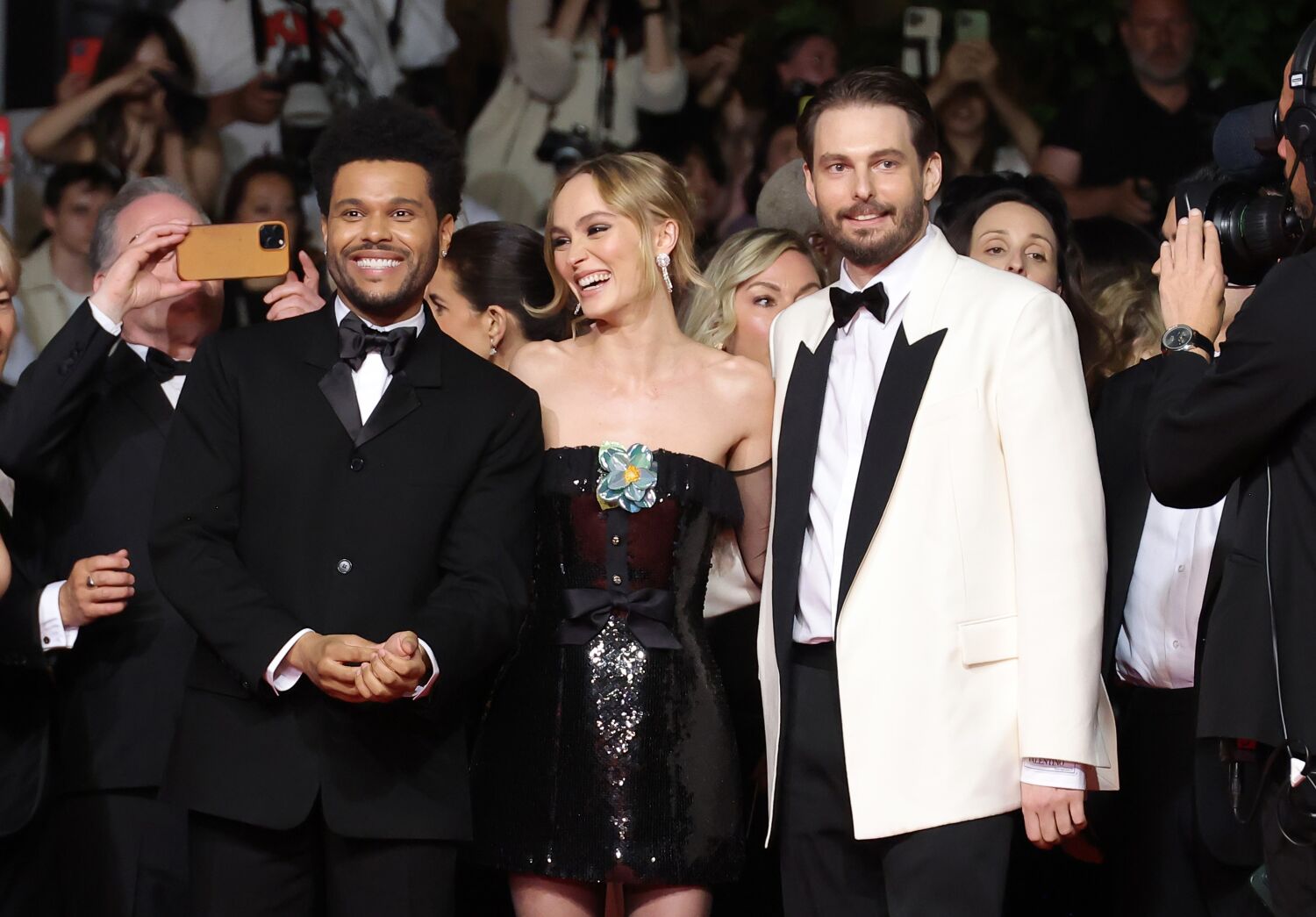‘The Idol’ attempts to rouse Cannes. But it’s not as shocking as it thinks it is
The median age of the crowds along the Croisette dropped by about 20 years Monday night when the Cannes Film Festival held a gala premiere for HBO’s upcoming, rumor-plagued series “The Idol.”
It’s not the first television series to debut at Cannes, but it is certainly the oddest. In 2017, festival director Thierry Frémaux reversed a long-held position that film festivals are only for movies, inviting Jane Campion and Ariel Kleiman’s “Top of the Lake: China Girl” and David Lynch’s “Twin Peaks: The Return” to premiere outside competition.
Campion and Lynch, both past winners of the Palme d’Or had history with the festival, as did Olivier Assayas, who, five years later, brought his series “Irma Vep” to Cannes, where he had debuted his 1996 film of the same name.
“The Idol” has no such connections. Starring Lily-RoseDepp, as a troubled pop star, and Abel Tesfaye (more commonly known as the Weeknd), as the cult leader who ensnares her, “The Idol” is writer-director Sam Levinson’s follow-up to the hit HBO drama “Euphoria,” with a similar penchant for graphic sex, cute clothes and self-destruction.
In other words, a, well, naked attempt to bring the TikTok generation back to cinema with a tantalizing nepo-baby vibe, along with hints of scandal.
In March, Rolling Stone ran an article titled: “‘The Idol’: How HBO’s Next ‘Euphoria’ became Twisted ‘Torture Porn,’” which featured one unnamed source on the production comparing parts of the story line to a “rape fantasy.” Others alleged that original director Amy Seimetz’s surprising exit was forced because Tesfaye, who is also co-creator, felt the show was leaning too hard into the female perspective.
After the story published, Tesfaye posted a clip on Twitter and Instagram in which the character disparages the publication. Tesfaye captioned the post, “Rolling Stone, did we upset you?”
As for Depp, she said in a statement that she found it “interesting that people have so much to say about the show already, and they haven’t even seen it.”
Well, now we’ve seen it, or at least the first two episodes of it, seamlessly stitched together for the purposes of the festival and ending on a note that was, quite frankly, no more elliptical than some of the films featured here.
Is it torture porn? Well, Depp’s Jocelyn, who is attempting to mount a comeback after the recent loss of her mother stalled her career, is certainly tortured in many ways for our entertainment. Early scenes include an argument about whether signs of her recent mental breakdown, in the form of a hospital bracelet she wears in the shoot, are sexy or not; the dismissal of an intimacy coordinator; and a revenge-porn photo of her with semen on her face posted to the internet days before her latest single drops.
Her naked, and near-naked, breasts are on constant display — Jocelyn favors tops that are either diaphanous or consist of tiny under-boob-revealing triangles — and with several sex scenes that are graphic (especially aurally) even by HBO standards, the term “porn” is not inaccurate, though it’s tough to imagine anyone would consider any of the action erotic when it is so ham-fisted.
Jocelyn is so passively self-destructive that she chokes herself while she masturbates. This makes it easy to believe she would be attracted to a club owner/Svengali named Tedros (Tesfaye) who uses suffocation as foreplay, even if he dresses like a hipster Mephistopheles and has such a “rapey vibe,” to quote Joss’ personal assistant (Rachel Sennott), that whenever he shows up, the score goes full-on “Phantom of the Opera.”
But it’s also more than a tiny bit ridiculous. However one may feel about light choking as a turn-on, a singer who is messing with her vocal chords is in 75 kinds of trouble.
“The Idol” attempts to be both a dark satire of the music business and a more general contemplation of power. The first hour opens with a photo shoot in which Jocelyn, in close-up, is being directed by an unseen photographer through a gamut of emotions — cool, innocent, sexy, vulnerable — a tableau reflected darkly in the second hour when Tedros blindfolds her and directs her through a series of sexual poses. The point being that one thing may not be unlike the other; a pop star since she was very young, Joceyln’s life has always been controlled by others.
There are blatant Britney Spears echoes bouncing around, so obvious that during an early scene she works on a dance number that is observed to be an homage to Spears.
In case, you know, you missed the comparison.
Like Spears, Jocelyn is continually swarmed by a team of people who are concerned about her mental and emotional state only so far as it allows her to make money for them. These include a terrific Jane Adams, Hank Azaria making a baffling accent choice, and Da’Vine Joy Randolph whose character appears to have an actual heart and who steals every scene she is in.
Tedros too is interested in controlling Jocelyn’s career, along with the careers of his many followers, who lie around in half-naked heaps in his club when the day is done. It’s difficult to take him seriously when Tesfaye leans into every villainous trope short of twirling his mustache (he has a rat-tail instead.)
But he is the Weeknd and, as the screaming throngs of young women lining the Croisette on Monday night appear to indicate, that might be enough.
For all the latest Entertainment News Click Here
For the latest news and updates, follow us on Google News.

